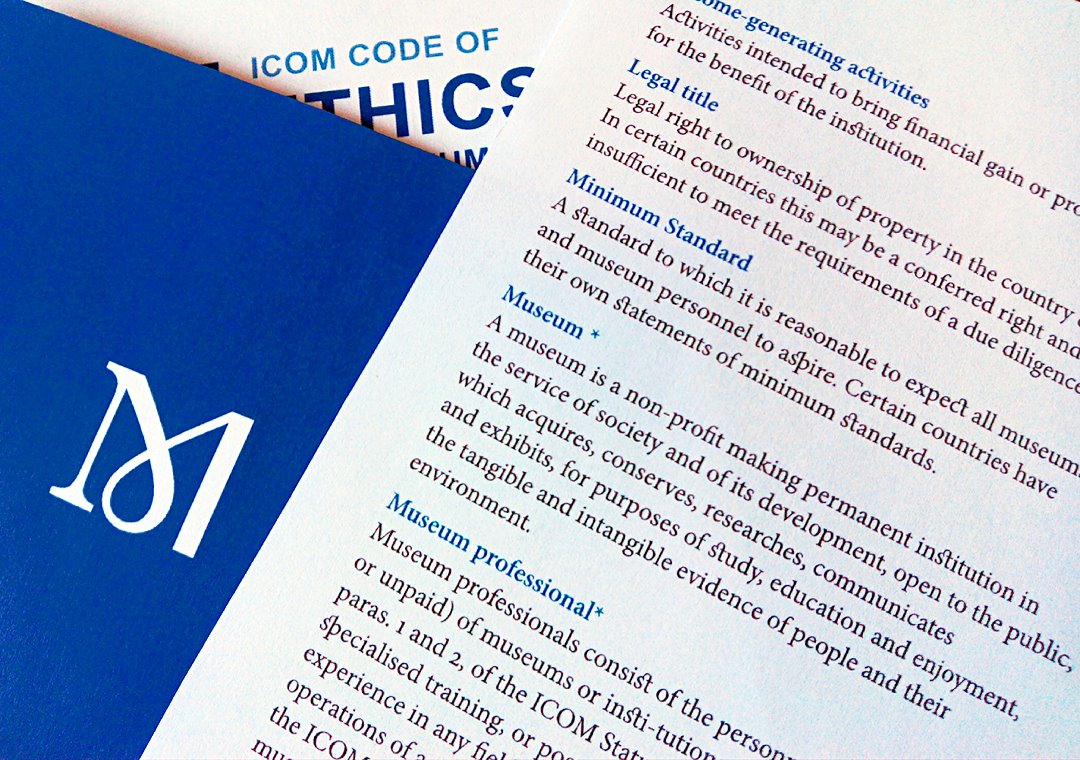Code of Ethics

The ICOM Code of Ethics for Museums is a reference text setting standards for the practice of museum professionals.
The ICOM Code of Ethics for Museums sets minimum professional standards and encourages the recognition of values shared by the international museum community.
This reference tool provides guidance and is presented as a series of principles supported by guidelines detailing expected professional practice. It was drafted in a cross-cutting manner and conceived as an instrument of professional self-control. ICOM members must accept and comply with the Code’s rules.
The ICOM Code of Ethics for Museums addresses diverse museum-related topics such as acquisition procedures, compliance with legislation, management of resources, security, returns and restitutions. The Code also advocates strong principles playing a key role in the fight against illicit traffic, for instance concerning due diligence and provenance.
ICOM promotes and advocates its Code during training sessions organised all over the world, including practical cases studies, to help museums professionals apply its values and principles. A Standing Committee on Ethics (ETHCOM) is dedicated to handling museums’ ethical issues that are brought to its attention.
After being first adopted in 1986, and revised in 2004, the Code has been translated into 38 languages.
Revision of the Code of Ethics
Following the 25th General Conference of ICOM, held in Kyoto in 2019, ICOM decided that the Code should be reviewed and, if necessary, revised (141 Session of the Executive Board). In the review, the ICOM membership recommended a revision of the Code. The review process, which is based on an iterative and transparent methodology involving four consultations with the ICOM membership, began in 2022.
In preparation for the next stage of the revision process, two webinars will be organised. On 15 September at 14.00 CET, a dedicated session will be held with the Chairs of all ICOM Bodies. ICOM leaders will have the opportunity to contribute their valuable, additional feedback and comment on the third draft of the revised ICOM Code of Ethics. On 6 October, a global webinar will invite the wider ICOM membership to explore the relationship between the revision and the 2004 Code of Ethics, while engaging with the latest version of the revised draft of the Code of Ethics before its presentation at the General Conference in Dubai.
2020 – Initiating the Revision
- The ICOM Standing Committee on Ethics (ETHCOM) proposed that the ICOM Code of Ethics should be revisited.
2021 – Deciding to Revise the Code
- A first survey was carried out among ICOM members to determine whether the Code should be revised.
- The results confirmed the need for revision and helped to identify what was missing or unclear in the 2004 version of the Code.
2022 – Identifying Changes
- ETHCOM conducted a second consultation asking for the members’ opinions about revising the Code of Ethics and their evaluation of each of the 8 Principles in the 2004 Code of Ethics.
- The consultation focused on identifying what should be amended, added, or removed.
2023 – Creating an Outline
- Based on the feedback from the second consultation, an outline was developed that proposed a set of core topics and related statements for the revised Code.
- This outline was shared during the third round of consultations with ICOM’s National and International Committees, Regional Alliances, and Affiliated Organisations for feedback and suggestions.
2024 – Drafting the Revised Code
- Incorporating the results of the third consultation, a first full draft of the revised Code was shared with ICOM membership.
- ICOM launched a preliminary review of this first full draft with its membership.
2025 – Refining the Revised Code
- Based on the preliminary review, a second full draft was presented to ICOM membership.
- A fourth consultation of the second full draft was conducted with National and International Committees, Regional Alliances, and Affiliated Organisations focusing on reviewing and refining the Code’s statements, supporting descriptions, and additions to the glossary.
- The feedback from the fourth consultation is being assessed and used to develop the next draft of the revised Code of Ethics.
- ICOM will host a plenary session during the General Conference.
2026 Finalising the Code
- In June 2026, ICOM will vote on the final draft of the Revised Code of Ethics for Museums.
STANDARDS ON ETHICS
- Guidelines on Deaccessioning of the International Council of Museums (ETHCOM, 2019)
- Standards on Accessioning of the International Council of Museums (ETHCOM, 2020)
- Standards on Fundraising of the International Council of Museums (ETHCOM, 2020)
Code of Ethics for Natural History Museums
The ICOM Code of Ethics for Natural History Museums, established by ICOM’s International Committee for Natural History Museums (NATHIST) in collaboration with ICOM’s Ethics Committee (ETHCOM), was formally approved at the 28th ICOM General Assembly on 17 August, 2013 in Rio de Janeiro, Brasil.
The purpose of the document is to define ethical standards on issues specific to Natural History Museums, providing standards of professional practice that can serve as a normative basis for museum institutions.
The Code of Ethics for Natural History Museums begins with a position statement that explains the purpose of Natural History Museums and their responsibilities. It then focuses on the specific challenges of Natural History Museums in six sections, from the presentation of human remains and the dissemination of scientific data to the collection of rocks, minerals and fossils. The Code ends with specific standards for taxidermy.
Checklist on ethics of cultural property ownership
Considering the complexity of the ethical questions affecting the work of museums today, the Checklist is a tool for two purposes: it sets out the 8 organising principles that shape the detailed articles of the ICOM Code, as well as providing orientation and support in dealing with these complex topics; and it offers a list of contacts for further advice on particular questions.
